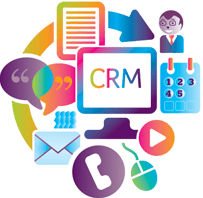Do You Have the Tools to Track Your Fleet?

In a very real way, the Internet has spoiled us, to the point that we fully expect an order to be in our hand in 72 hours – oftentimes, far less than that. Shipping speeds like these are now possible thanks to the use of advanced logistics. If you’re starting to incorporate eCommerce into your […]
4 Signs That Say You Need Small Business CRM

Developing relationships with customers is the backbone for any small business. Customer referrals and word of mouth are the best lead generation tools. How you develop and nurture these relationships is key. That is why a CRM (customer relationship management) system is essential. According to this article, at its simplest, a CRM system allows businesses […]
Implementing a CRM: Where Should You Begin?

Customer Relationship Management Implementation As a SMB, considering the options to organize your customer data can leave you with more questions than answers. There are dozens of Customer Relationship Management, or CRM, system options out there and plenty of companies also specializing in industry-specific (consumer goods, financial services, industrial sector, etc.) or customized CRMs. If […]
What is CRM Integration and What Are It’s Benefits?

The whole point of CRM (Customer Relationship Management) software, is to keep all of your customer’s information organized so that you have no problem keeping track of it, while also managing customer activities and conversations. This lends a helping hand, specifically, to the customer service, marketing and sales teams because with the information collected, they […]
How Important is CRM Integration?

When you operate a business, building and maintaining a relationship with your clientele is crucial. In today’s business environment, the key to success is forging long-term relationships. It is becoming more and more difficult for a company to differentiate by the product or services provided, and therefore, a company’s main differentiating factor must focus on […]

